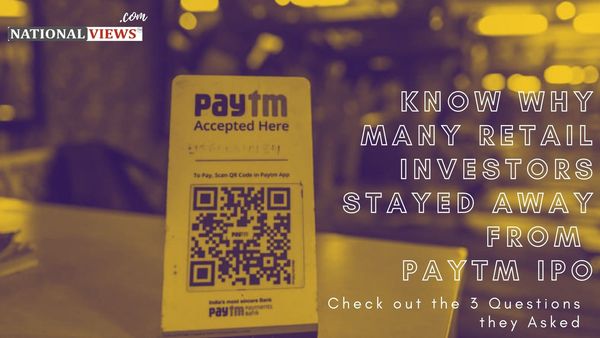The PayTM IPO on its market debut plunged terribly. While, many of the investors who had subscribed to the IPO expressed shock, there were plenty who were of the opinion, ‘yeh toh hona hi tha’ And mind you this wasn’t some narrow escape scenario for them, in fact, they had their calculated justified reasons to stay away from this IPO.
Here we share the many questions that were rightly interrogated by the retail stock market investors before diving into the PayTM IPO prospects. That’s correct, know why many retail investors stayed away from PayTM IPO despite the success of other Indian unicorn like Zomato.
PyTM IPO: Is It Rightly Valued?
The PayTM IPO share price was Rs. 2,080 to Rs. 2,150 per equity share. The valuations were quite expensive, almost 49 times more than its current revenues. One could consider taking risk based on the future prospects but then the account book didn’t appear convincing. Besides, we are well versed how even after the massive promotion of PayTM post demonetization by the government and its promoters, the startup company could never post profits.
Next, starting from FY19 till date the cash flow is in negative. The reason being, additional working capital needs and high operating losses. All these factors were enough to classify the IPO in a ‘very high-risk bet’ which made it quite clear that there wasn’t any need or greed to risk money into something that may not see a sizeable jump when it gets listed on the exchanges. This made many wait as no investors these days want to take the peril of falling in a financial trap especially when there are options.
Is PayTM, a Market Leader in its Domain?
Although digital payments in India continue to grow, the competition seems to be growing too. Major players like Google Pay, PhonePe are doing much better in the same space. So, even if one risked the money considering the financial growth in the coming years, it was quite essential to note the fact that neither PayTM is a market leader nor does the company has given a vision or a projection as to how it will garner profits in the future amidst the tough competition.
PayTM is dabbling into multiple business lines but even today it isn’t the market leader of any one business despite being into the industry from past 10 years now. So, many of the retail investors preferred not to risk the money predicting the dip especially given the offer price. A regular trader mentioned how he could have easily purchased if the offer price would have been anything less than 1,000 despite everything but anything beyond that was simply unnecessary.
Also Read: What are Trading Biases & How to avoid Them
Is This Going to be RPOWER and General Insurance Corporation of India?
Some of the biggest IPOs in India have seen both, the hits and the major flops. Reliance Power and General Insurance Corporation of India are two such examples that flopped big time on the listing day and could never reach the IPO issuing price of Rs. 450 and Rs. 912 respectively. The latest trading price of RPOWER is Rs. 12 (something) while that of General Insurance Corporation of India is Rs. 145 something. So, many of the retail investors did control their buying urge by reminding themselves how high valuation can be a nightmare.
But then when I asked a young investor about ZOMATO (a startup suffering loss) being a major hit that rose to 65% on the listing day, she quickly highlighted how Zomato is a pioneer, market leader and why being the first to list had its own advantage. Besides, unlike PayTM its offering price was Rs 76 – retail investors still could risk a bit but PayTM was too high-priced. If you see most of the big investors stayed away from PayTM due to its overvaluation and they surely expected a major correction unlike retail investors who bought the share due to FOMO.
Lastly, many of them were reluctant given the conservative way to invest in an IPO which waived a huge red flag against PayTM. Yes, these are the reasons why many retail investors stayed away from PayTM IPO.
Nevertheless, there is always a way to purchase the missed-out IPOs in the coming days after the listing no matter how amazingly it opens but certainly no U-turn if the stock bombs big time on D-day. Now, does that mean you should never invest in an IPO? Well, you should but only after thorough analysis, calculation and asking relevant questions rather than putting your money due to the fear of missing out.


